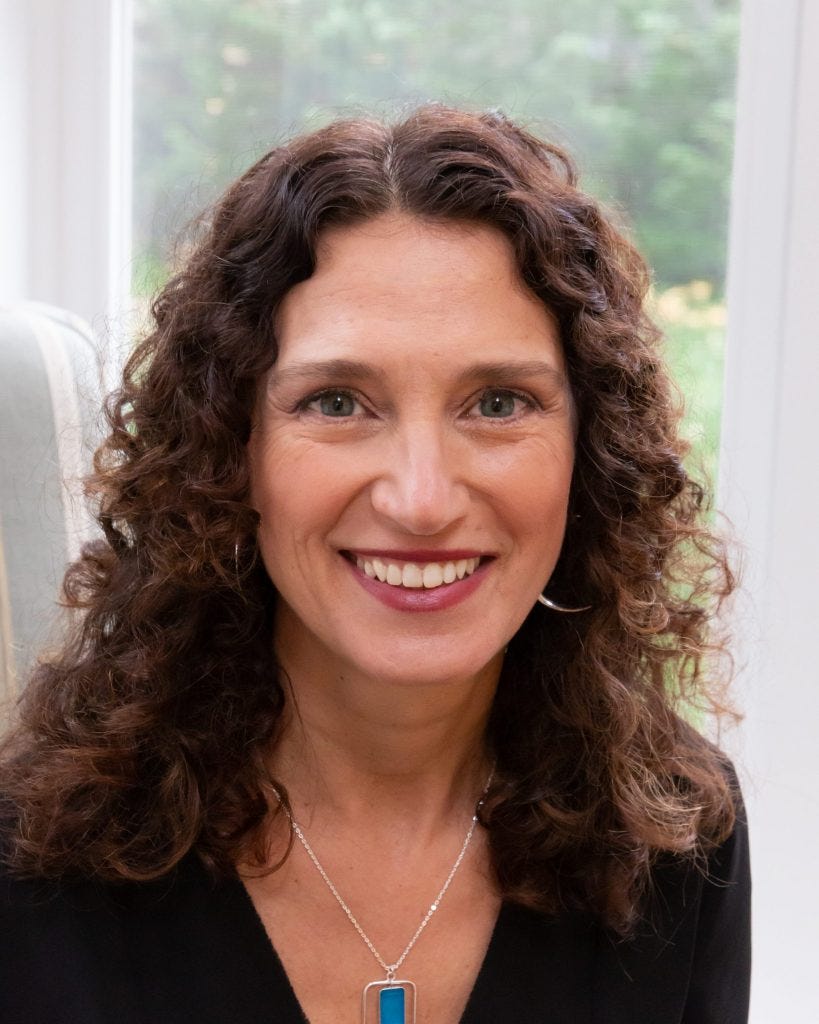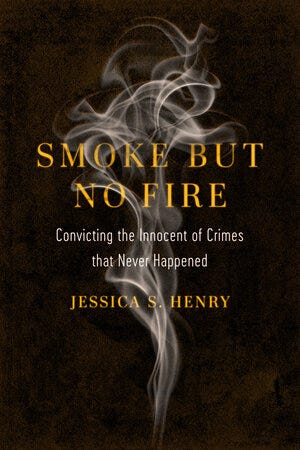Five Questions with Criminal Justice Expert Jessica Henry
The professor and former public defender weighs in on crimes that never happened
I’ve been fascinated with the Salem Witch Trials and true crime documentaries about the wrongly accused for years. Still, I never connected the dots between the two until reading Jessica Henry’s book.
In Smoke But No Fire: Convicting the Innocent of Crimes That Never Happened, Henry, a professor at Montclair State University and former New York City public defender, carefully documents examples of people convicted of non-existent crimes. The stories range from daycare workers accused of satanic child abuse in the 1980s to cases of police planting evidence and judges admitting shoddy scientific evidence. It’s an excellent book for true crime fans and anyone interested in criminal justice reform.
Jessica was kind enough to talk with me about her book, the phenomenon behind it and what books she recommends.
Our conversation has been edited and condensed for clarity.
Can you describe the process of researching and writing Smoke But No Fire?
One of the courses I teach is about wrongful convictions. I was doing some research for it and came upon some data that was showing one-third of all known exonerations were no-crime wrong convictions.
I thought the data had to be wrong, so I reached out to the National Registry of Exonerations, and they confirmed it. I couldn’t believe it. So, I started doing some digging because I was so curious and fascinated and horrified. And sure enough, one-third of all known exonerations involve innocent people convicted of crimes that literally never happened.
I think the best way to talk about criminal justice issues is to tell stories, so I spent a lot of time finding stories that illustrated how these no-crime wrongful convictions happen. I used a lot of case studies from the National Registry of Exonerations database, the Innocence Project and the Death Penalty Information Center.
And then I did a big deep dive into the literature on psychology, sociology, criminology and law to kind of fill in the blanks about all the theory and how these things come to pass. For instance, to examine police contributions to wrongful convictions, I had to look at police culture, but I also had to look at the psychology of interrogations and social science around what we know about eyewitness identification.
There are so many devastating stories in Smoke But No Fire. Is there one in particular that stuck with you?
So many stories in the book slayed me. They just broke my heart.
A number of them focus on parents who are accused of murdering their own child, who later is revealed to have actually died of some sort of undiagnosed illness.
I start the book off with one of those stories about Rodricus Crawford. It’s such a powerful story because it not only tells this heartbreaking tale of this man who was accused of murdering his own son, but it also reveals the systemic biases that exist about race, about class and the way people rush to judgment when they’ve got a marginalized or disadvantaged person on their radar. It’s also about how Louisiana’s criminal justice system is so broken and how the death penalty is so dangerous because you run the risk of executing an innocent person. All of that is packed into Rodricus Crawford’s story, but there are so many [examples] throughout the book.
Can you talk more about how non-crime convictions disproportionately affect the poor and people of color?
It’s a really important point. Our criminal justice system is always biased against the poor, which translates into being biased against poor people of color. You see that reflected time and again in these stories because poor people do not have the resources to adequately fight charges against them. And there are so many examples with that subtlety.
But there are also instances I talk about in my book about overt examples of racism, where judges make racist comments or prosecutors make racist comments or reflect or engage in actions that are about racial biases.
How can we have faith in a system — and this is certainly not unique to no-crime wrongful convictions — but how do we have faith in a system that so frequently targets poor people and people of color?
Is there anything that gives you hope for reforming our criminal justice system?
I am a hopeful person in general, and some things are changing. Some states, for instance, have instituted bail reform. That can have a huge impact on poor people who’ve been accused of crimes, particularly at the misdemeanor level. It may allow for people to fight cases rather than plead guilty.
The whole conversation happening nationally about police reform may ultimately yield changes in policing that will benefit all of us. It will make society safer while reducing the number of people pulled into the criminal justice ambit.
Virginia just abolished capital punishment. President Biden has said he’s committed to abolishing the federal death penalty. To me, that is helpful. So, there are things happening that make me hopeful.
And, we are electing progressive prosecutors all over the country. I don’t want to overstate that because there’s still so much work to be done but having a progressive prosecutor in place can make a tremendous difference.
Are there any books you want to recommend in general and in particular for people who enjoyed Smoke But No Fire?
I just finished reading The Searcher by Tana French. It’s just so gorgeous and evocatively written. It was a great book, and I loved it.
If you want nonfiction recommendations about wrongful convictions. I have a few. Just Mercy by Bryan Stevenson is such a great, accessible book. And I think it’s so powerful, and it talks about criminal justice reform. Blind Injustice by Mark Godsey and The Central Park Five by Sarah Burns are great books.
If you want to go down to real basics, Actual Innocence: Five Days to Execution and Other Dispatches from the Wrongly Convicted is a wonderful book written by Barry Scheck and Peter Neufeld, who started the Innocence Project, and Jim Dwyer.
There are really powerful memoirs from exonerees. Two that have come out in the last few years are amazing. The Sun Does Shine: How I Found Life, Freedom, and Justice by Anthony Ray Hinton and Solitary by Albert Woodfox, who spent 40 years in solitary confinement for a crime he did not commit.
Then, fiction books that have done a nice job with wrongful convictions recently are An American Marriage by Tayari Jones and a new YA book that hit last year called Punching the Air by Ibi Zoboi and Yusef Salaam about a teenage boy accused of a crime.
You can follow Jessica on Twitter and Instagram and purchase her book here. Jessica is donating the proceeds from her book sales to organizations that support exonerees.
If you have a suggestion for a future Q&A, let me know by replying to this email or dropping a comment below.
What to Read If is a free weekly book recommendation newsletter. Need a rec? Want to gush about a book? Reply to this email, leave a comment or find me on Twitter @elizabethheld.
If you’re reading this on Substack or were forwarded this email, and you’d like to subscribe, click the button below.







Pinyonpinesmurders.com